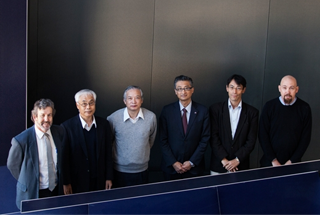Bonding over the building blocks of life

ANU and Osaka University recently came together to host a three day symposium on protein chemistry. But the bond between the two institutions runs much deeper, especially when it comes to collaborating on research to better understand the chemical composition of life.
The Protein Structure and Function symposium held at the ANU Research School of Chemistry was a chance to bring some of the best protein science researchers from across the Asia-Pacific region together.
Protein science is an exciting field that brings together life science and chemistry. Proteins are the building blocks of the cell and they play an important role in keeping us all alive.
Understanding how proteins interact in the body is also important to treating illness such as Alzheimer's disease.
The symposium covered new directions for protein research as scientists are now making use of advances in computational science and technology to look at proteins in a new light.
“Protein research has been rapidly changing, from analysing individual protein molecules to understanding the protein complex, revealing biological information from protein interactions,” said Professor Yuji Goto from Institute for Protein Research at Osaka University in Japan.
For one of the symposium organisers, Dr Damien Hall, the event not only represented a chance to get some of the best protein chemists in the Asia Pacific region together - it was a chance to share his love of science with those closest to him.
“A highlight for me was when my wife Dr. Nami Hirota, brought my three daughters in to attend a session of the conference,” said Dr Hall from the Research School of Chemistry.
“After listening to Professor Gottfried Otting's seminar on protein structure determination my 10-year-old daughter Lily told me she wanted to become a structural biologist. This gave me quite a smile.”
The symposium comes a year after a formal agreement was signed to foster scientific collaboration between the ANU Research School of Chemistry and the Institute for Protein Research (IPR) at Osaka University in Japan.
“It is well known that the ANU Research School of Chemistry has many great researchers in the field of biological chemistry, so the link between ANU and Institute for Protein Research (IPR) is very suitable for realising our mission,” said IPR Director, Professor Haruki Nakamura.
And the benefits go both ways.
“With regard to protein research, the Institute of Protein Research is the best institute in Japan, and potentially the best in the world due to its top notch staff and incredible resources,” said Dr Damien Hall from the Research School of Chemistry.
As part of the agreement between the two institutions, Dr Hall has been appointed as an Associate Professor at IPR, and travels to Japan twice a year for two to three months at a time.
“IPR is an extremely academically stimulating place to work. I count many researchers there as my personal friends,” Dr Hall said.
There are also plans to run exchanges between the institutions for students.
Professor Goto from Osaka University added that research collaborations such as this are vital when taking a multi-scale approach to understanding protein science.
“Our primary mission is to facilitate advanced protein studies. To achieve this, we focus on supporting domestic and international collaborations, providing access to various facilities and databases,” Professor Goto said.
The three day symposium was a joint initiative between the IPR at Osaka University and the RSC at ANU. Strong local Australian support was provided by the John Curtin School of Medicine, the Research School of Biology and CSIRO. Japanese and Asian partner groups included Osaka University and the Asia Pacific Protein Association.
On behalf of the Organizing Committee (photo shown), the respective joint Australian and Japanese Chairs, Professor John A. Carver and Professor Yuji Goto, would like to thank all sponsors and participants for helping to create three days of enjoyable and excellent science.
